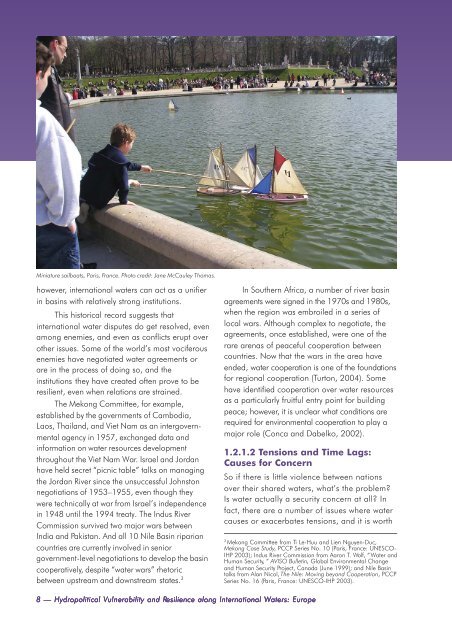Europe - UNEP
Europe - UNEP
Europe - UNEP
Create successful ePaper yourself
Turn your PDF publications into a flip-book with our unique Google optimized e-Paper software.
Miniature sailboats, Paris, France. Photo credit: Jane McCauley Thomas.<br />
however, international waters can act as a unifier<br />
in basins with relatively strong institutions.<br />
This historical record suggests that<br />
international water disputes do get resolved, even<br />
among enemies, and even as conflicts erupt over<br />
other issues. Some of the world’s most vociferous<br />
enemies have negotiated water agreements or<br />
are in the process of doing so, and the<br />
institutions they have created often prove to be<br />
resilient, even when relations are strained.<br />
The Mekong Committee, for example,<br />
established by the governments of Cambodia,<br />
Laos, Thailand, and Viet Nam as an intergovernmental<br />
agency in 1957, exchanged data and<br />
information on water resources development<br />
throughout the Viet Nam War. Israel and Jordan<br />
have held secret “picnic table” talks on managing<br />
the Jordan River since the unsuccessful Johnston<br />
negotiations of 1953–1955, even though they<br />
were technically at war from Israel’s independence<br />
in 1948 until the 1994 treaty. The Indus River<br />
Commission survived two major wars between<br />
India and Pakistan. And all 10 Nile Basin riparian<br />
countries are currently involved in senior<br />
government-level negotiations to develop the basin<br />
cooperatively, despite “water wars” rhetoric<br />
between upstream and downstream states. 3<br />
In Southern Africa, a number of river basin<br />
agreements were signed in the 1970s and 1980s,<br />
when the region was embroiled in a series of<br />
local wars. Although complex to negotiate, the<br />
agreements, once established, were one of the<br />
rare arenas of peaceful cooperation between<br />
countries. Now that the wars in the area have<br />
ended, water cooperation is one of the foundations<br />
for regional cooperation (Turton, 2004). Some<br />
have identified cooperation over water resources<br />
as a particularly fruitful entry point for building<br />
peace; however, it is unclear what conditions are<br />
required for environmental cooperation to play a<br />
major role (Conca and Dabelko, 2002).<br />
1.2.1.2 Tensions and Time Lags:<br />
Causes for Concern<br />
So if there is little violence between nations<br />
over their shared waters, what’s the problem?<br />
Is water actually a security concern at all? In<br />
fact, there are a number of issues where water<br />
causes or exacerbates tensions, and it is worth<br />
3<br />
Mekong Committee from Ti Le-Huu and Lien Nguyen-Duc,<br />
Mekong Case Study, PCCP Series No. 10 (Paris, France: UNESCO-<br />
IHP 2003); Indus River Commission from Aaron T. Wolf, “ Water and<br />
Human Security, ” AVISO Bulletin, Global Environmental Change<br />
and Human Security Project, Canada (June 1999); and Nile Basin<br />
talks from Alan Nicol, The Nile: Moving beyond Cooperation, PCCP<br />
Series No. 16 (Paris, France: UNESCO-IHP 2003).<br />
8 — Hydropolitical Vulnerability and Resilience along International Waters: <strong>Europe</strong>
















